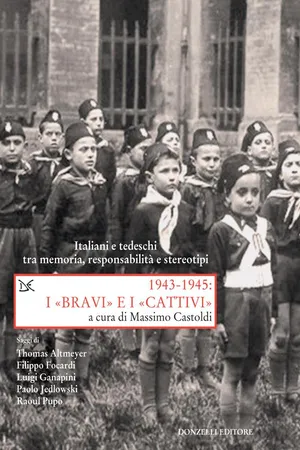
1943-1945: I «BRAVI» e I «CATTIVI»
Italiani e tedeschi tra memoria, responsabilità e stereotipi
Massimo Castoldi
- Italian
- «éPÜB (möbïlé fřïéñdly) Ñ ω É»
- «Äväïläblé öñ ïÖS & Äñdřöïd Ü ü Ä»
1943-1945: I «BRAVI» e I «CATTIVI»
Italiani e tedeschi tra memoria, responsabilità e stereotipi
Massimo Castoldi
«Äböüt Thïs Böök ö ñ»
L'elaborazione di una memoria condivisa e consapevole sugli ultimi anni della seconda guerra mondiale ha conosciuto, in Germania e in Italia, percorsi differenti, scanditi da tempi e sensibilità che è utile mettere a confronto, in sede di ricostruzione storica. Questo volume presenta un approccio comparativo alla questione, attraverso la voce di alcuni tra i massimi specialisti, italiani e tedeschi, della materia. Dopo decenni di oblio, in Germania, scrive Thomas Altmeyer, si è avviato un processo di recupero dei luoghi della memoria del nazismo e di fondazione di centri di documentazione, nei quali è in atto una ricerca costante sui modi di trasmissione della memoria alla collettività e alle nuove generazioni. Diversa la storia italiana, che, pur avendo elaborato fin dal 1945 una memoria diffusa dell'antifascismo e della Resistenza, è ancora segnata da reticenze sui crimini perpetrati dal fascismo in Italia e nei territori occupati. Ciò è in relazione con lo stereotipo culturale del «bravo italiano» che, secondo Filippo Focardi, sia la monarchia, desiderosa di liberarsi dalle complicità col regime, sia le forze antifasciste, in cerca di una legittimazione interna e internazionale, avevano interesse a diffondere. Sulle vicende del confine orientale Raoul Pupo, indagando oltre i miti interpretativi, riposiziona i conflitti in questi territori in una prospettiva plurale e storicamente compiuta. All'origine dello stereotipo del «cattivo» tedesco e del «bravo» italiano c'è, sostiene Luigi Ganapini, anche il disorientamento di molti cittadini, tra vittimismo e sconcerto, conseguente all'8 settembre, che pure ha generato dispersioni e conflitti di memoria. Il tema di Paolo Jedlowski è infine proprio la difficoltà italiana di elaborare una memoria autocritica, capace di conservare anche il ricordo dei «torti che noi abbiamo fatto ad altri», e che è il contrario della memoria autocelebrativa, e implicitamente autoassolutoria, ancora molto diffusa.
Frequently asked questions
«Iñföřmätïöñ É»
«Täblé öf çöñtéñts ç é»
- Copertina
- Frontespizio
- Copyright
- Indice
- Introduzione
- I. La memoria rimossa e ritrovata. Passato e presente delle attività commemorative in Germania
- II. Il «bravo italiano» e il «cattivo tedesco». Stereotipi nazionali e costruzione di una memoria europea
- III. Per una storia critica delle vicende del confine orientale
- IV. L’8 settembre nelle memorie degli italiani
- V. La difficile costruzione di una memoria autocritica
- Gli autori